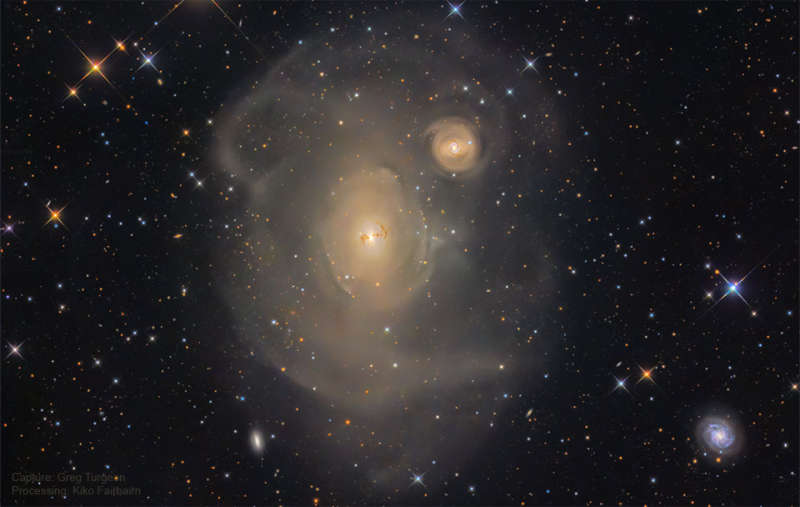Credit & Copyright: Capture:
Greg Turgeon;
Processing:
Kiko Fairbairn
Explanation:
Astronomers turn detectives when trying to
figure out the cause of startling sights like
NGC 1316.
Investigations indicate that
NGC 1316
is an enormous elliptical galaxy
that started, about 100 million years ago, to devour a smaller
spiral galaxy neighbor,
NGC 1317, just on the upper
right.
Supporting evidence includes the dark
dust lanes
characteristic of a
spiral galaxy,
and faint swirls and shells of stars and gas visible in this
wide and deep image.
One thing that
>remains unexplained is the unusually small
globular star clusters,
seen as faint dots on the image.
Most elliptical galaxies have
more and brighter globular clusters than
NGC 1316.
Yet the observed
globulars are too old to have been
created by the recent
spiral collision.
One hypothesis is that these
globulars
survive from an even earlier
galaxy
that was subsumed into
NGC 1316.
Another surprising attribute of
NGC 1316,
also known as Fornax A, is its
giant lobes of gas that glow brightly in
radio waves.
1999 2000 2001 2002 2003 2004 2005 2006 2007 2008 2009 2010 2011 2012 2013 2014 2015 2016 2017 2018 2019 2020 2021 2022 2023 2024 2025 |
Yanvar' Fevral' Mart Aprel' Mai Iyun' Iyul' Avgust Sentyabr' Oktyabr' Noyabr' Dekabr' |
NASA Web Site Statements, Warnings, and Disclaimers
NASA Official: Jay Norris. Specific rights apply.
A service of: LHEA at NASA / GSFC
& Michigan Tech. U.
|
Publikacii s klyuchevymi slovami:
NGC 1316 - colliding galaxies - stalkivayushiesya galaktiki
Publikacii so slovami: NGC 1316 - colliding galaxies - stalkivayushiesya galaktiki | |
Sm. takzhe:
Vse publikacii na tu zhe temu >> | |
